The European Commission has given the green light for a genetically modified soybean to be used in both food and animal feed, following a thorough evaluation by the European Food Safety Authority. This move, as described by the EU executive, is part of a meticulous assessment process aimed at ensuring the safety of human and animal health, as well as environmental protection.
“This authorization signifies a significant step towards enhancing our food and feed resources,”
remarked an agricultural expert familiar with the decision.
“Genetically modified crops have been engineered to improve characteristics such as pest resistance or nutritional content, offering potential benefits for agriculture and sustainability.”
Importantly, it’s crucial to note that this approval does not permit the cultivation of this genetically modified soybean within the European Union; rather, it pertains solely to its importation for use in food and animal feed. The authorization comes with a validity period of 10 years during which products derived from this modified soybean must adhere to the stringent labeling and traceability regulations set forth by the EU.
“The decision-making process around GMOs involves weighing various factors such as scientific evidence, public opinion, and economic considerations,”
explained a policy analyst specializing in agricultural biotechnology.
“It’s a complex landscape where regulators navigate between promoting innovation while ensuring consumer safety and environmental sustainability.”
The Commission emphasized that its ruling was necessitated by the failure of Member States to reach a definitive majority either in support or opposition to granting authorization. This underscores how GMO approvals can spark debates reflecting differing viewpoints on technology adoption, risk assessment frameworks, and market dynamics.
As discussions on genetically modified organisms (GMOs) continue across Europe, stakeholders grapple with striking a balance between harnessing biotechnological advancements for food security and addressing concerns related to biodiversity conservation and consumer choice. The evolution of regulatory frameworks governing GMOs reflects an ongoing dialogue on agricultural practices that resonate with societal values and scientific progress.
In conclusion, while the authorization of this genetically modified soybean opens new avenues for utilizing biotechnology in food production systems within the EU market under strict guidelines,
it also underscores the complexities surrounding GMO regulation – encompassing scientific uncertainties,
public perceptions, ethical considerations,
and broader implications for sustainable agriculture.
Experts emphasize that fostering transparent dialogues among policymakers,
scientists,
industry players,
and consumers is crucial for navigating these intricacies effectively
and shaping policies that align with diverse stakeholder interests while upholding safety standards
and fostering innovation in agriculture.








Leave feedback about this